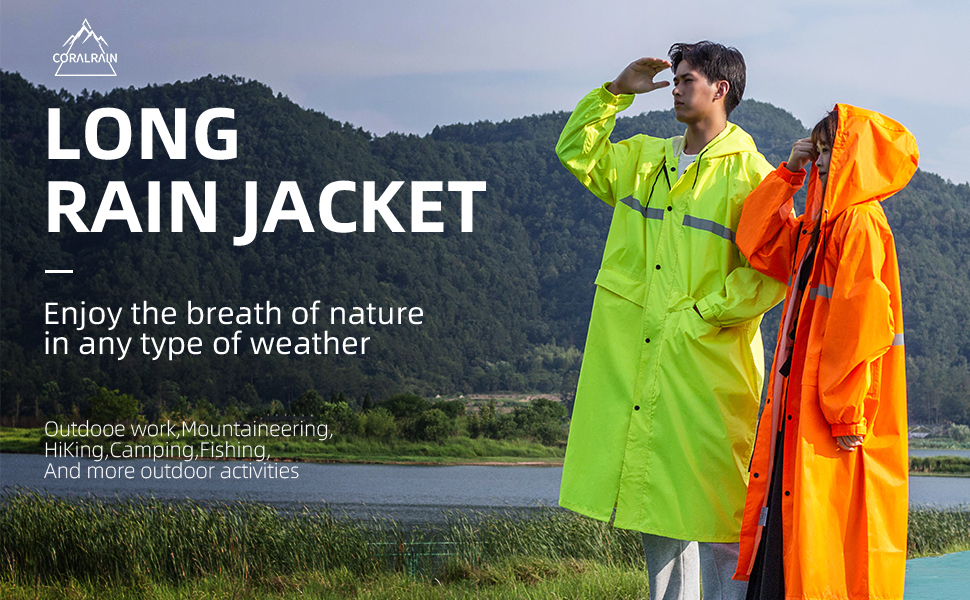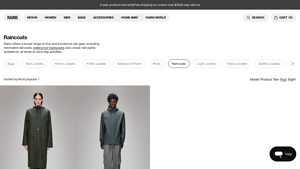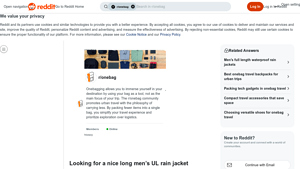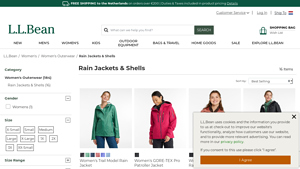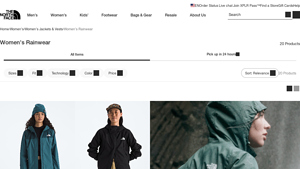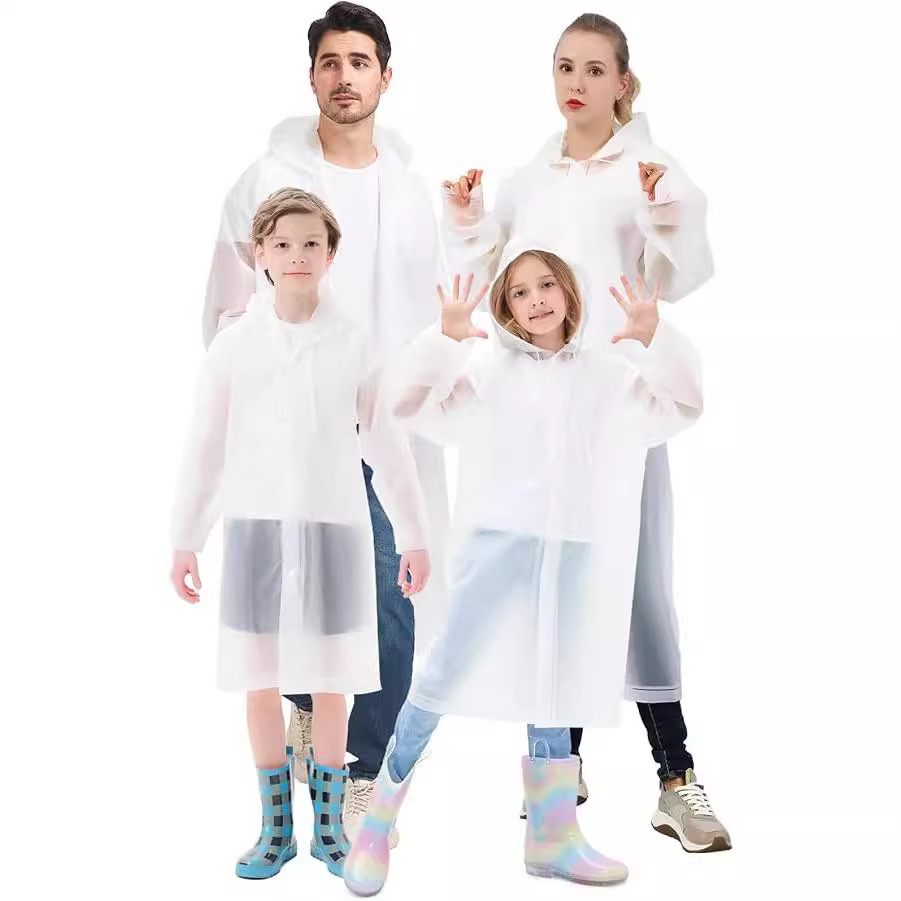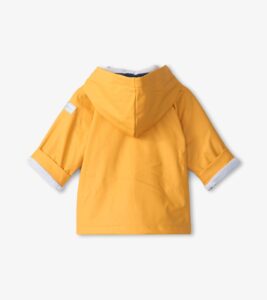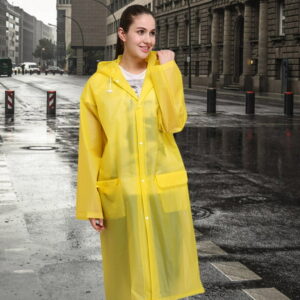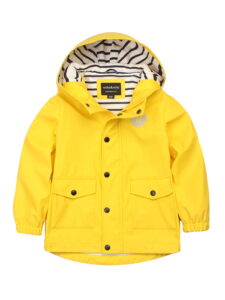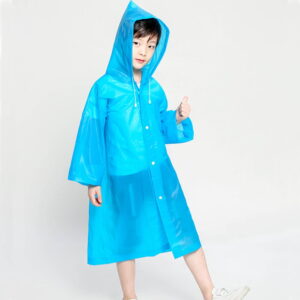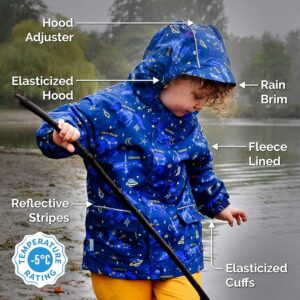Introduction: Navigating the Global Market for Long Rain Jacket
In today’s unpredictable climate, sourcing high-quality long rain jackets has become a crucial challenge for international B2B buyers. With varying weather conditions across Africa, South America, the Middle East, and Europe, businesses need reliable, stylish, and functional rainwear to meet the demands of their customers. This comprehensive guide addresses key aspects of the long rain jacket market, including different styles, intended applications, supplier vetting processes, and pricing strategies.
By exploring the latest trends and innovations in long rain jackets, buyers will be equipped to make informed decisions that align with their operational needs and customer preferences. This guide not only highlights the importance of material quality and design versatility but also emphasizes the necessity of understanding regional market dynamics and consumer expectations.
Whether you are looking to stock your retail store or supply corporate clients, this resource empowers you to navigate the complexities of the global long rain jacket market effectively. With insights tailored to your specific geographic context—be it the humid climates of Southeast Asia or the temperate regions of Europe—this guide ensures that you can confidently source the right products that meet both aesthetic and functional requirements.
Article Navigation
- Top 5 Long Rain Jacket Manufacturers & Suppliers List
- Introduction: Navigating the Global Market for Long Rain Jacket
- Understanding Long Rain Jacket Types and Variations
- Key Industrial Applications of Long Rain Jacket
- 3 Common User Pain Points for ‘Long Rain Jacket’ & Their Solutions
- Strategic Material Selection Guide for Long Rain Jacket
- In-depth Look: Manufacturing Processes and Quality Assurance for Long Rain Jacket
- Practical Sourcing Guide: A Step-by-Step Checklist for ‘Long Rain Jacket’
- Comprehensive Cost and Pricing Analysis for Long Rain Jacket Sourcing
- Alternatives Analysis: Comparing Long Rain Jacket With Other Solutions
- Essential Technical Properties and Trade Terminology for Long Rain Jacket
- Navigating Market Dynamics and Sourcing Trends in the Long Rain Jacket Sector
- Frequently Asked Questions (FAQs) for B2B Buyers of Long Rain Jacket
- Important Disclaimer & Terms of Use
- Strategic Sourcing Conclusion and Outlook for Long Rain Jacket
Understanding Long Rain Jacket Types and Variations
| Type Name | Key Distinguishing Features | Primary B2B Applications | Brief Pros & Cons for Buyers |
|---|---|---|---|
| Classic Long Raincoat | Traditional cut, waterproof fabric, often unisex | Retail, outdoor events, corporate gifts | Pros: Timeless style, versatile use. Cons: May lack advanced features. |
| Fishtail Parka | Extended back for coverage, adjustable drawstring waist | Fashion retail, outdoor activities | Pros: Stylish, good for layering. Cons: Heavier than other types. |
| Lightweight Jacket | Ultralight materials, packable, breathable | Travel, outdoor activities | Pros: Easy to carry, quick-drying. Cons: Less durable in harsh conditions. |
| Trench Coat Style | Longer length, tailored fit, often features a belt | Corporate attire, formal events | Pros: Professional appearance, versatile for different settings. Cons: Limited waterproofing in heavy rain. |
| Performance Jacket | Advanced materials, features like pit zips and hoods | Extreme sports, hiking, outdoor work | Pros: High functionality, excellent weather resistance. Cons: Higher price point. |
What are the Characteristics of a Classic Long Raincoat?
The Classic Long Raincoat is a staple in rainwear, characterized by its traditional cut and waterproof fabric. Typically available in unisex designs, this type of raincoat is ideal for various applications, from retail to corporate gifting. When considering B2B purchases, buyers should focus on fabric quality and style versatility, ensuring that the product appeals to a broad audience. While it offers timeless elegance, it may lack the advanced features found in modern alternatives.
How Does a Fishtail Parka Differ from Other Rain Jackets?
The Fishtail Parka stands out with its extended back, providing additional coverage and warmth. This style often includes adjustable features like a drawstring waist, allowing for a customizable fit. It is well-suited for fashion retail and outdoor activities, appealing to consumers who prioritize style alongside functionality. B2B buyers should consider the balance between aesthetic appeal and practicality, noting that while it is stylish, it may be heavier than other options.
Why Choose a Lightweight Jacket for B2B Purchases?
Lightweight Jackets are crafted from ultralight materials, making them easy to pack and carry. Their breathable nature makes them ideal for travel and outdoor activities, catering to businesses targeting active consumers. When sourcing these jackets, B2B buyers should evaluate the balance between weight and durability, as lighter jackets may not withstand extreme conditions. However, their quick-drying properties are a significant advantage for businesses focusing on convenience.
What Makes a Trench Coat Style Suitable for Corporate Attire?
Trench Coat Styles are longer in length with a tailored fit, often featuring a belt that enhances their professional appearance. These jackets are perfect for corporate attire and formal events, making them a popular choice for businesses looking to convey sophistication. Buyers should prioritize the quality of materials and waterproofing capabilities, as these can vary significantly. While they offer a polished look, their performance in heavy rain may not match that of more functional designs.
What are the Benefits of a Performance Jacket for Extreme Conditions?
Performance Jackets are designed with advanced materials and features such as pit zips and hoods to enhance their functionality. These jackets are ideal for extreme sports, hiking, and outdoor work, appealing to businesses catering to adventurous consumers. B2B buyers should focus on the jacket’s weather resistance and overall durability, as these factors significantly impact their suitability for harsh environments. While they tend to be pricier, the investment can lead to higher customer satisfaction and loyalty.
Key Industrial Applications of Long Rain Jacket
| Industry/Sector | Specific Application of Long Rain Jacket | Value/Benefit for the Business | Key Sourcing Considerations for this Application |
|---|---|---|---|
| Agriculture | Protective gear for field workers during rain | Ensures worker safety and productivity in adverse weather | Durability, waterproofing, breathability, and comfort |
| Construction | Gear for construction crews on outdoor sites | Protects workers from rain, reducing downtime and risk | Material quality, fit for layering, and compliance with safety standards |
| Outdoor Recreation & Tourism | Clothing for guides and tourists in wet climates | Enhances customer experience and safety during outdoor activities | Lightweight, packable design, and stylish options for branding |
| Transportation & Logistics | Uniform for delivery personnel in all weather | Maintains employee comfort and professionalism in varied conditions | Visibility features, ease of movement, and customization options |
| Oil & Gas | Protective wear for field operators in rainy regions | Minimizes exposure to the elements, ensuring safety and efficiency | Compliance with industry standards, flame resistance, and durability |
How are Long Rain Jackets Used in Agriculture?
In the agricultural sector, long rain jackets serve as essential protective gear for field workers, particularly during the rainy season. These jackets help maintain worker safety and productivity by keeping them dry while they perform tasks such as planting, harvesting, or tending to crops. Buyers in this sector should prioritize durability, waterproofing, and breathability to ensure that the jackets withstand rigorous use and varying climatic conditions, especially in regions like Africa and South America where heavy rains can be frequent.
What Role Do Long Rain Jackets Play in Construction?
Construction crews often work outdoors, making long rain jackets crucial for maintaining safety and productivity on job sites during inclement weather. These jackets protect workers from rain, reducing the risk of accidents and the likelihood of project delays. When sourcing for construction applications, businesses should consider jackets that offer a good fit for layering, are made from high-quality materials, and comply with local safety regulations, particularly in regions with strict labor laws.
How Do Long Rain Jackets Enhance Outdoor Recreation and Tourism?
In the outdoor recreation and tourism industry, long rain jackets are vital for guides and tourists who may encounter unpredictable weather. These jackets not only keep individuals dry but also enhance the overall customer experience by ensuring comfort during outdoor activities like hiking, camping, or sightseeing. B2B buyers in this sector should look for lightweight, packable designs that are also stylish, allowing for easy branding and promotion of their services, particularly in tourist-heavy regions of Europe and the Middle East.
Why Are Long Rain Jackets Important for Transportation and Logistics?
For delivery personnel working in all weather conditions, long rain jackets provide necessary protection from rain, ensuring employees remain comfortable and professional while on the job. This is particularly important for companies looking to maintain a positive brand image. When sourcing rain jackets for this application, businesses should focus on features like visibility enhancements, ease of movement, and the potential for customization to reflect company branding, especially in urban environments where delivery operations are prevalent.
How Do Long Rain Jackets Benefit the Oil and Gas Industry?
In the oil and gas sector, where operations often take place in remote, rainy locations, long rain jackets are essential for field operators to minimize exposure to harsh weather conditions. These jackets help ensure safety and efficiency while working in the field. Buyers in this industry must consider jackets that comply with specific industry standards, such as flame resistance and durability, to protect workers effectively in challenging environments.
3 Common User Pain Points for ‘Long Rain Jacket’ & Their Solutions
Scenario 1: Sizing Challenges with Long Rain Jackets for Diverse Markets
The Problem: B2B buyers often face difficulties in sourcing long rain jackets that cater to a wide range of body types and sizes, particularly when dealing with international markets. Buyers may find that standard sizing does not translate effectively across different regions, leading to discrepancies in fit and customer dissatisfaction. For example, a buyer in South America may find that sizes labeled as “large” in one region do not correspond with the expectations in another, causing issues in inventory management and returns. This can result in increased costs and lost sales opportunities.
The Solution: To address sizing challenges, B2B buyers should prioritize working with suppliers who offer comprehensive sizing charts and guidelines tailored to different regions. This can include requesting data on local sizing standards and incorporating feedback from local market trends to refine the sizing of long rain jackets. Additionally, establishing a flexible return policy can mitigate the risks associated with sizing discrepancies. Buyers can also consider stocking a range of sizes, including extended and petite options, to accommodate diverse body types effectively. Collaborating with manufacturers that provide custom sizing or made-to-order options can further enhance customer satisfaction and reduce the likelihood of overstock.
Scenario 2: Durability Concerns in Harsh Weather Conditions
The Problem: Buyers from regions prone to extreme weather conditions, such as heavy rain or storms, may struggle to find long rain jackets that offer adequate durability and weather resistance. A common pain point is sourcing jackets that can withstand prolonged exposure to harsh elements without compromising functionality. For instance, a distributor in the Middle East may find that many jackets fail to perform under high humidity, resulting in customer complaints and potential returns.
The Solution: To ensure durability, buyers should focus on sourcing long rain jackets constructed from high-quality, weather-resistant materials such as Gore-Tex or similar advanced fabrics. It’s essential to verify the product specifications, including waterproof ratings and breathability levels, and to request samples for real-world testing. Collaborating with manufacturers who have a proven track record in producing durable rain gear can provide assurance of quality. Furthermore, buyers should consider offering a warranty or guarantee on durability to enhance customer confidence in their products, thereby reducing the risk of returns and increasing brand loyalty.
Scenario 3: Balancing Style and Functionality in Long Rain Jackets
The Problem: In a competitive marketplace, B2B buyers often face the challenge of sourcing long rain jackets that not only perform well but also appeal to consumers’ style preferences. Buyers may find that many functional jackets compromise on aesthetics, leading to lower sales in fashion-conscious markets like Europe. This disconnect can be particularly frustrating for retailers who want to attract a clientele that values both style and practicality.
The Solution: To meet the demand for stylish yet functional long rain jackets, buyers should seek partnerships with manufacturers who prioritize contemporary design along with performance features. This can involve selecting jackets that incorporate trendy colors, cuts, and embellishments while still maintaining their waterproof and breathable qualities. Conducting market research to identify popular styles in target demographics can guide sourcing decisions. Additionally, offering a curated collection that highlights both functionality and fashion can help buyers capture a broader audience. Establishing a feedback loop with customers can also inform future product lines and ensure that the offerings remain aligned with market trends, driving sales and customer satisfaction.
Strategic Material Selection Guide for Long Rain Jacket
When selecting materials for long rain jackets, it is essential to consider various factors that influence performance, durability, and cost. Here, we analyze four common materials used in the production of long rain jackets, focusing on their properties, advantages, disadvantages, and specific considerations for international B2B buyers.
What are the Key Properties of Polyester in Long Rain Jackets?
Polyester is a widely used synthetic material known for its durability and resistance to shrinking and stretching. It has a moderate temperature rating and performs well under pressure, making it suitable for various weather conditions. Polyester is also resistant to corrosion, which is beneficial for jackets exposed to rain and humidity.
Pros and Cons: The durability of polyester makes it a popular choice, but it can be less breathable compared to other materials. It is relatively inexpensive, which can lower manufacturing costs. However, the production process can be complex, requiring specific treatments to enhance waterproof capabilities.
Impact on Application: Polyester is compatible with various media, including water and moisture, making it ideal for rain jackets. However, it may not perform as well in extreme temperatures.
Considerations for International Buyers: Buyers from regions like Africa and the Middle East should ensure that the polyester complies with local regulations regarding textile safety and environmental standards. Familiarity with ASTM or DIN standards can aid in ensuring compliance.
How Does Nylon Compare as a Material for Long Rain Jackets?
Nylon is another popular choice for rain jackets due to its lightweight nature and excellent water resistance. It has a higher temperature and pressure rating than polyester, providing better performance in extreme weather conditions.
Pros and Cons: The key advantage of nylon is its strength and durability, which makes it suitable for rugged use. However, it can be more expensive than polyester and may require additional treatments to ensure waterproofing. Manufacturing complexity is also higher due to the need for specialized coatings.
Impact on Application: Nylon is highly compatible with water, making it ideal for rain jackets. Its lightweight nature makes it suitable for outdoor activities, but it may not provide adequate insulation in colder climates.
Considerations for International Buyers: B2B buyers should consider the availability of nylon in their regions and whether it meets local quality standards. Additionally, understanding the environmental impact of nylon production is crucial, especially in markets that prioritize sustainability.
What are the Advantages of Using Gore-Tex for Long Rain Jackets?
Gore-Tex is a premium waterproof and breathable fabric that has become synonymous with high-performance rain gear. Its unique membrane technology allows moisture to escape while preventing water from entering, making it ideal for long rain jackets.
Pros and Cons: The primary advantage of Gore-Tex is its superior waterproofing and breathability, which enhances comfort during prolonged wear. However, it comes at a higher price point, making it less accessible for budget-conscious buyers. Manufacturing Gore-Tex can also be complex due to its specialized technology.
Impact on Application: Gore-Tex is highly effective in wet conditions, making it suitable for outdoor activities in diverse climates. Its breathability helps regulate temperature, but it may not be necessary for all use cases, especially in milder climates.
Considerations for International Buyers: Buyers should verify that Gore-Tex products comply with international standards for waterproofing and breathability. Additionally, understanding the warranty and durability guarantees offered by manufacturers is essential for long-term investment.
How Does PVC Perform as a Material for Long Rain Jackets?
Polyvinyl chloride (PVC) is a synthetic plastic polymer known for its waterproof properties and affordability. It is often used in budget-friendly rain jackets and offers decent protection against rain.
Pros and Cons: PVC is cost-effective and provides excellent waterproofing, making it suitable for casual use. However, it lacks breathability, which can lead to discomfort during extended wear. Additionally, PVC can be less durable than other materials, leading to potential wear and tear over time.
Impact on Application: PVC is effective in protecting against water, but its lack of breathability can make it unsuitable for high-intensity activities. It is primarily used in environments where cost is a significant factor.
Considerations for International Buyers: Buyers should be aware of the environmental implications of PVC production and its compliance with regulations in their regions. Ensuring adherence to safety standards is crucial, particularly in markets that emphasize eco-friendly practices.
Summary Table of Material Selection for Long Rain Jackets
| Material | Typical Use Case for Long Rain Jacket | Key Advantage | Key Disadvantage/Limitation | Relative Cost (Low/Med/High) |
|---|---|---|---|---|
| Polyester | General-purpose rain jackets | Durable and cost-effective | Less breathable than alternatives | Medium |
| Nylon | High-performance outdoor jackets | Lightweight and strong | Higher cost and manufacturing complexity | High |
| Gore-Tex | Premium waterproof jackets | Superior waterproofing and breathability | Expensive and complex to manufacture | High |
| PVC | Budget-friendly rain jackets | Excellent waterproofing | Lacks breathability and durability | Low |
This guide provides actionable insights for B2B buyers, helping them make informed decisions regarding material selection for long rain jackets based on performance, cost, and regional considerations.
In-depth Look: Manufacturing Processes and Quality Assurance for Long Rain Jacket
What Are the Key Stages in the Manufacturing Process of Long Rain Jackets?
The manufacturing process of long rain jackets involves several crucial stages that ensure the final product is both functional and aesthetically pleasing. Understanding these stages helps B2B buyers assess supplier capabilities and ensure quality.
Material Preparation: What Materials Are Used for Long Rain Jackets?
The first step in the manufacturing process is material preparation. Long rain jackets are typically made from waterproof and breathable fabrics, such as nylon or polyester, treated with durable water repellent (DWR) finishes. These materials are selected for their lightweight properties and ability to withstand harsh weather conditions.
Once the materials are sourced, they undergo quality checks to confirm their specifications, including weight, color, and waterproofing performance. This step is critical as it sets the foundation for the jacket’s overall performance.
How Are Long Rain Jackets Formed and Assembled?
After material preparation, the next stage is forming. This involves cutting the fabric into specific patterns that correspond to the jacket’s design. Advanced cutting techniques, such as laser cutting, are often employed to ensure precision and reduce fabric waste.
The assembly stage follows, where the cut fabric pieces are sewn together. This process may include multiple techniques such as flatlock stitching, which enhances comfort and durability, and taped seams, which prevent water from seeping through. Quality control checkpoints are integrated into this stage to verify stitching quality and alignment.
What Finishing Touches Are Applied to Long Rain Jackets?
Once assembled, long rain jackets undergo a finishing process. This includes additional treatments like the application of waterproof coatings and the addition of functional features such as zippers, pockets, and hoods. These features are not only functional but also contribute to the jacket’s overall style and usability.
Final inspections are critical at this stage to ensure that all components function correctly and meet design specifications. The jackets may also be pressed or steamed to achieve the desired appearance before packaging.
What Quality Assurance Standards Should Be Considered?
Quality assurance is paramount in the manufacturing of long rain jackets. International standards such as ISO 9001 are critical for ensuring that suppliers maintain a consistent quality management system. Compliance with these standards is a strong indicator of a supplier’s commitment to quality.
Additionally, industry-specific certifications, such as CE marking for products sold in Europe, may be required. These certifications ensure that the products meet safety, health, and environmental protection standards.
How Are Quality Control Checkpoints Integrated Throughout the Manufacturing Process?
Quality control is a multi-faceted process that includes several checkpoints:
-
Incoming Quality Control (IQC): This step involves inspecting raw materials upon arrival. B2B buyers should verify that suppliers conduct thorough inspections to ensure the materials meet the required specifications.
-
In-Process Quality Control (IPQC): This occurs during the manufacturing process. Regular inspections help identify defects early and prevent them from progressing to later stages. This may include checking stitching quality and seam integrity.
-
Final Quality Control (FQC): Before packaging, finished jackets undergo comprehensive inspections. This includes checking for defects in stitching, waterproof performance, and overall appearance.
What Common Testing Methods Are Used for Long Rain Jackets?
Several testing methods are employed to ensure long rain jackets meet performance standards:
-
Waterproof Testing: The most common method is the hydrostatic head test, which measures the fabric’s ability to withstand water pressure. This test is essential for verifying that the jacket will keep the wearer dry.
-
Breathability Testing: This is often assessed using the moisture vapor transmission rate (MVTR) test, which measures how well the fabric allows moisture to escape. Breathable jackets help maintain comfort during physical activities.
-
Durability Testing: Abrasion resistance tests help determine how well the jacket can withstand wear and tear, ensuring it meets the demands of outdoor use.
How Can B2B Buyers Verify Supplier Quality Control?
B2B buyers should take proactive steps to verify the quality control processes of their suppliers:
-
Supplier Audits: Conducting on-site audits allows buyers to assess the manufacturing processes and quality control measures firsthand. This can provide deeper insights into the supplier’s operational capabilities.
-
Quality Reports: Requesting detailed quality reports can offer transparency into the supplier’s performance metrics. This should include data from IQC, IPQC, and FQC stages.
-
Third-Party Inspections: Engaging third-party inspection services can provide an unbiased assessment of the manufacturing quality. This is particularly important for international transactions where buyers cannot visit the facilities.
What Are the QC and Certification Nuances for International Buyers?
International buyers, particularly those from regions like Africa, South America, the Middle East, and Europe, should be aware of specific nuances related to quality control and certifications:
-
Local Regulations: Different countries have varying regulations concerning textile products. Buyers should ensure that their suppliers are compliant with local laws in their target markets.
-
Documentation: Importing goods often requires specific documentation, including certificates of conformity and compliance with international standards. Ensuring that suppliers can provide these documents is vital for smooth transactions.
-
Cultural Considerations: Understanding cultural differences in business practices can help buyers navigate negotiations and establish strong relationships with suppliers.
By being knowledgeable about these manufacturing processes and quality assurance practices, B2B buyers can make informed decisions when sourcing long rain jackets, ensuring they receive high-quality products that meet their customers’ needs.
Practical Sourcing Guide: A Step-by-Step Checklist for ‘Long Rain Jacket’
To assist international B2B buyers in sourcing long rain jackets effectively, this guide offers a structured checklist to ensure that all critical factors are considered. By following these steps, buyers can make informed decisions that align with their business needs and customer expectations.
Step 1: Define Your Target Market and Usage
Identifying the specific market segment you are targeting is essential. Long rain jackets can cater to various demographics and climates, so understanding your customers’ needs—be it urban professionals or outdoor enthusiasts—will influence your design and material choices. Consider factors such as local weather patterns, cultural preferences, and style trends prevalent in your target regions, such as Africa, South America, the Middle East, and Europe.
Step 2: Determine Technical Specifications
Establishing clear technical specifications is vital for product quality and performance. Consider the following:
– Waterproof Ratings: Look for jackets with a minimum waterproof rating of 10,000 mm for effective protection.
– Breathability: Ensure the fabric allows moisture to escape, which is crucial for comfort during extended wear.
– Material Composition: Opt for lightweight, durable materials that are also environmentally friendly, such as recycled polyester.
Step 3: Evaluate Potential Suppliers
Before making a commitment, thoroughly vet potential suppliers. Request detailed company profiles, including:
– Certifications: Verify if they have relevant certifications such as ISO, which indicates adherence to international quality standards.
– References: Ask for case studies or testimonials from other clients in similar markets to gauge their reliability and product quality.
Step 4: Assess Product Range and Customization Options
Examine the supplier’s product range to ensure they can meet your diverse needs. A good supplier should offer:
– Variety of Styles: Look for options that include different lengths, fits, and styles to cater to various customer preferences.
– Customization: Consider suppliers who provide customization options, such as color choices and branding, to enhance your product’s market appeal.
Step 5: Negotiate Pricing and Terms
Once you have shortlisted suppliers, it’s time to negotiate pricing and terms. Keep these points in mind:
– Volume Discounts: Inquire about pricing structures based on order volume to maximize your budget.
– Payment Terms: Establish clear payment terms that align with your cash flow needs, such as net 30 or net 60 days.
Step 6: Conduct Quality Assurance Checks
Quality assurance is critical to maintaining your brand’s reputation. Implement the following:
– Sample Orders: Before placing a large order, request samples to evaluate the quality, fit, and overall appeal of the jackets.
– Inspection Protocols: Set up inspection protocols during production and upon delivery to ensure products meet your specifications.
Step 7: Plan for Logistics and Distribution
Finally, consider the logistics involved in sourcing and distributing your long rain jackets. Evaluate:
– Shipping Costs and Times: Understand the shipping options available and factor in costs and lead times to ensure timely delivery to your markets.
– Local Regulations: Familiarize yourself with import regulations and tariffs in your target regions to avoid unexpected costs.
By following this comprehensive sourcing checklist, B2B buyers can ensure they procure high-quality long rain jackets that meet both their business objectives and customer demands.
Comprehensive Cost and Pricing Analysis for Long Rain Jacket Sourcing
What Are the Key Cost Components for Sourcing Long Rain Jackets?
When sourcing long rain jackets, understanding the cost structure is crucial for B2B buyers. The primary components include materials, labor, manufacturing overhead, tooling, quality control (QC), logistics, and profit margins.
-
Materials: The choice of fabric is critical as it affects both performance and cost. High-quality waterproof materials, such as nylon and polyester blends, can significantly influence the price. Additionally, sustainable or recycled materials often come at a premium.
-
Labor: Labor costs vary by region and are impacted by local wage standards. In countries like Vietnam, labor costs may be lower, but this can affect the quality and craftsmanship of the final product. Understanding local labor markets can help buyers negotiate better pricing.
-
Manufacturing Overhead: This includes costs associated with factory operations, including utilities, equipment depreciation, and administrative expenses. These costs can be higher in countries with stricter labor laws or environmental regulations.
-
Tooling: Initial setup costs for manufacturing, such as molds and machinery, can be substantial. Buyers should inquire about tooling costs, especially for customized designs.
-
Quality Control (QC): Implementing strict QC measures is essential to ensure product quality, especially when sourcing from international suppliers. This can include inspections during production and pre-shipment checks, which may add to the overall cost.
-
Logistics: Shipping and handling fees can vary significantly based on the origin and destination of the goods. Consideration of Incoterms is essential, as they define the responsibilities of buyers and sellers in shipping logistics.
-
Margin: Suppliers typically add a profit margin that reflects their operational costs and market positioning. Understanding the margin structure can help buyers assess the fairness of the pricing.
How Do Price Influencers Affect Long Rain Jacket Sourcing?
Several factors can influence the pricing of long rain jackets, which B2B buyers should consider when negotiating:
-
Volume/MOQ: Minimum order quantities (MOQs) can significantly affect pricing. Higher order volumes generally lead to lower per-unit costs, making it advantageous for buyers looking to stock inventory.
-
Specifications and Customization: Custom designs and specific material requirements can increase costs. Buyers should clearly define their specifications to avoid unexpected charges.
-
Quality and Certifications: Products that meet specific quality standards or certifications (such as waterproof ratings) often come with higher price tags. Buyers should evaluate whether these certifications are necessary for their target market.
-
Supplier Factors: The reputation and reliability of the supplier can influence pricing. Established suppliers may charge more for their experience and consistent quality, while emerging manufacturers might offer competitive rates to build their portfolio.
-
Incoterms: Understanding the shipping terms can greatly impact total costs. Different Incoterms (like FOB, CIF, or DAP) dictate who bears the risk and responsibility at various points in the shipping process, affecting overall pricing.
What Negotiation Tips Can Help Achieve Cost-Efficiency in Long Rain Jacket Sourcing?
-
Leverage Volume Discounts: When negotiating, emphasize your potential order volume. Suppliers are often willing to reduce prices for bulk orders.
-
Consider Total Cost of Ownership (TCO): Evaluate not just the purchase price but also long-term costs, including shipping, storage, and potential returns. A lower upfront price might not always result in the best overall value.
-
Request Transparent Pricing: Ask suppliers for a breakdown of costs. Understanding how prices are structured can help identify areas for negotiation.
-
Build Relationships: Developing a strong relationship with suppliers can lead to better pricing and terms over time. Trust can often result in more favorable negotiations.
-
Be Aware of Regional Pricing Nuances: For buyers from Africa, South America, the Middle East, and Europe, understanding regional market conditions can provide leverage during negotiations. Different regions may have varying price sensitivity and competition levels.
Conclusion
Sourcing long rain jackets involves a detailed understanding of the associated costs and pricing influencers. By being informed about these elements and employing strategic negotiation techniques, B2B buyers can optimize their purchasing decisions, ensuring they acquire high-quality products at competitive prices. Always remember to approach sourcing as a long-term partnership rather than a one-time transaction to foster better terms and collaboration in the future.
Alternatives Analysis: Comparing Long Rain Jacket With Other Solutions
Understanding Alternatives to Long Rain Jackets for Rain Protection
In the quest for effective rain protection, businesses often evaluate various solutions to find the most suitable option for their needs. Long rain jackets are a popular choice due to their stylish design and functionality. However, other alternatives also exist that can provide similar benefits. This analysis compares long rain jackets with two viable alternatives: waterproof ponchos and hardshell jackets.
| Comparison Aspect | Long Rain Jacket | Waterproof Poncho | Hardshell Jacket |
|---|---|---|---|
| Performance | High waterproofing; stylish; good for moderate rain | Moderate waterproofing; lightweight; less coverage | Excellent waterproofing; durable; good for extreme conditions |
| Cost | $140 – $220 | $20 – $100 | $200 – $500 |
| Ease of Implementation | Easy to wear; immediate protection | Very easy to use; just throw on | Requires adjustment; can be complex to layer |
| Maintenance | Machine washable; requires care to maintain waterproofing | Minimal maintenance; generally durable | Requires specific cleaning; may need re-waterproofing |
| Best Use Case | Urban settings; casual wear; light to moderate rain | Casual outings; travel; emergencies | Hiking; extreme weather; professional use |
What Are the Advantages and Disadvantages of Waterproof Ponchos?
Waterproof ponchos offer a lightweight and versatile alternative to long rain jackets. Their ease of use makes them an attractive option for casual outings or travel. Ponchos are generally less expensive, making them budget-friendly for businesses looking to equip staff for occasional rain. However, they do not provide the same level of waterproofing or coverage as long rain jackets and can be less stylish, which may not align with branding needs. Their fit can also be less secure, leading to potential exposure to wind and rain.
How Do Hardshell Jackets Compare to Long Rain Jackets?
Hardshell jackets are designed for extreme weather conditions, offering superior waterproofing and durability. They are ideal for professionals in outdoor environments where heavy rainfall is common, such as in hiking or construction. However, hardshell jackets typically come with a higher price tag and may require more maintenance, including special cleaning and re-waterproofing treatments. Additionally, their bulkier design can limit mobility compared to the sleek fit of a long rain jacket, making them less suitable for urban settings or casual wear.
How Can B2B Buyers Choose the Right Rain Protection Solution?
When selecting a rain protection solution, B2B buyers should consider their specific operational needs and environments. Long rain jackets are ideal for urban settings where style and functionality are paramount, while waterproof ponchos can serve as a cost-effective option for casual use or emergencies. Hardshell jackets, although pricier, are best suited for extreme conditions and professional environments where durability is critical. Ultimately, the right choice will balance cost, performance, and the intended use case to ensure optimal protection against the elements.
Essential Technical Properties and Trade Terminology for Long Rain Jacket
What Are the Key Technical Properties of a Long Rain Jacket?
Understanding the essential technical properties of long rain jackets is crucial for B2B buyers to ensure quality, functionality, and marketability. Here are some key specifications:
1. Material Composition
Long rain jackets are typically made from various synthetic materials such as nylon or polyester, often treated for waterproofing. For instance, a 2.5-layer fabric may offer a balance between breathability and waterproofing. Buyers should consider the fabric’s weight, as lightweight options enhance mobility and comfort, making them suitable for outdoor activities.
2. Waterproof Rating (Hydrostatic Head)
This rating measures the water resistance of the fabric, usually expressed in millimeters (e.g., 5000 mm). A higher rating indicates better waterproof capabilities, essential for markets in regions with heavy rainfall. For B2B buyers, this specification ensures that the jacket will perform well under expected weather conditions, reducing returns and increasing customer satisfaction.
3. Breathability (MVTR)
Moisture Vapor Transmission Rate (MVTR) indicates how well the fabric allows moisture to escape. A higher MVTR rating ensures comfort during physical activities by preventing overheating and moisture buildup inside the jacket. Buyers should prioritize this feature for outdoor or active lifestyle markets, as it directly influences user comfort.
4. Seam Construction and Taping
Seams can significantly affect a jacket’s waterproof performance. Taped seams, where waterproof tape is applied over stitched seams, enhance water resistance. B2B purchasers should look for jackets with fully taped seams for maximum protection, as this specification is critical for durability and performance in wet conditions.
5. Fit and Design Features
Long rain jackets often come in various fits (e.g., regular, slim, or relaxed) and designs (e.g., parka-style or fitted). Features such as adjustable hoods, cuffs, and hems enhance functionality. Buyers should consider the target demographic when selecting styles, as preferences can vary significantly across different regions and cultures.
6. Sustainability Factors
With increasing consumer demand for eco-friendly products, the sustainability of materials used in long rain jackets is becoming more important. Certifications like Global Recycled Standard (GRS) or OEKO-TEX can be valuable selling points. B2B buyers should consider the sourcing and manufacturing practices of their suppliers to align with market trends.
What Are Common Trade Terms in the Long Rain Jacket Industry?
Familiarity with industry jargon is essential for effective communication and negotiation in the B2B space. Here are some commonly used terms:
1. OEM (Original Equipment Manufacturer)
OEM refers to a company that produces parts or equipment that may be marketed by another manufacturer. In the context of long rain jackets, this term is vital for buyers looking to source jackets from manufacturers who will customize products under their brand.
2. MOQ (Minimum Order Quantity)
MOQ is the smallest quantity of a product that a supplier is willing to sell. Understanding MOQ is crucial for B2B buyers to manage inventory costs effectively. Buyers should negotiate MOQs to align with their sales forecasts and inventory turnover rates.
3. RFQ (Request for Quotation)
An RFQ is a document sent to suppliers requesting pricing and terms for specific products. For long rain jackets, submitting an RFQ helps buyers gather competitive pricing and terms from multiple suppliers, facilitating better purchasing decisions.
4. Incoterms (International Commercial Terms)
Incoterms define the responsibilities of buyers and sellers in international transactions. Terms like FOB (Free on Board) or CIF (Cost, Insurance, and Freight) dictate who bears shipping costs and risks, making it essential for buyers to understand these terms to avoid unexpected expenses.
5. Lead Time
This term refers to the time taken from placing an order to receiving the products. For long rain jackets, understanding lead times is crucial for planning inventory and meeting market demand, especially in seasonal markets.
6. Quality Assurance (QA)
QA encompasses the processes and procedures that ensure products meet specified requirements and standards. For buyers, understanding the QA processes of suppliers can help mitigate risks related to product quality and compliance, leading to greater customer satisfaction.
By grasping these technical properties and trade terms, B2B buyers can make informed decisions that align with their operational goals and market demands.
Navigating Market Dynamics and Sourcing Trends in the Long Rain Jacket Sector
What Are the Current Market Dynamics and Key Trends in the Long Rain Jacket Sector?
The long rain jacket market is experiencing a robust transformation driven by several global factors. Climate change has led to increased rainfall in many regions, particularly in Africa, South America, and parts of Europe and the Middle East. This has heightened the demand for functional yet stylish rain gear. International B2B buyers are increasingly seeking products that not only meet practical needs but also align with contemporary fashion trends. The rise of e-commerce has facilitated access to diverse suppliers, enabling buyers to source long rain jackets that cater to various consumer preferences.
Emerging technologies in sourcing and manufacturing are also reshaping the market. Companies are leveraging data analytics to forecast demand trends, optimize inventory, and enhance the customer experience. Additionally, advancements in fabric technology have led to the development of lighter, more breathable, and durable materials, making long rain jackets more appealing to consumers. The integration of augmented reality (AR) for virtual try-ons is gaining traction, particularly in online retail, allowing buyers to enhance their purchasing decisions.
Furthermore, the global shift towards sustainable practices is becoming increasingly significant. B2B buyers are prioritizing suppliers who demonstrate a commitment to eco-friendly materials and ethical manufacturing processes. As a result, brands that emphasize innovation in product design, sustainability, and consumer engagement are likely to gain a competitive edge in this dynamic market.
How Is Sustainability and Ethical Sourcing Affecting the Long Rain Jacket Sector?
Sustainability is not just a trend; it has become a core business principle that influences purchasing decisions in the long rain jacket sector. The environmental impact of textile production, including high water usage and pollution, has led to a growing demand for eco-friendly alternatives. Buyers are increasingly focusing on brands that utilize recycled materials, such as recycled polyester, and those that incorporate water-resistant technologies without harmful chemicals.
Ethical sourcing is equally important, as consumers and businesses alike are becoming more aware of the social implications of their purchases. B2B buyers should seek suppliers that maintain transparent supply chains, ensuring fair labor practices and safe working conditions. Certifications such as Global Organic Textile Standard (GOTS) or OEKO-TEX® Standard 100 are indicators of a brand’s commitment to sustainability and ethical sourcing, providing buyers with confidence in their purchasing choices.
Moreover, the use of biodegradable materials and sustainable packaging solutions is gaining traction, appealing to environmentally conscious consumers. By prioritizing sustainability in their sourcing strategies, B2B buyers can not only meet the growing consumer demand for eco-friendly products but also contribute positively to the environment and society.
What Is the Evolution and History of Long Rain Jackets in the B2B Context?
The long rain jacket has a rich history that reflects both functional design and evolving consumer needs. Initially developed for practical purposes, these jackets were primarily utilitarian, designed to protect against harsh weather conditions. Over the years, however, they have evolved into a fashion statement, blending functionality with style.
The late 20th century saw a significant shift as outdoor enthusiasts and urban consumers began to demand more versatile and stylish options. The introduction of innovative materials and technologies in the 21st century, such as breathable waterproof fabrics, allowed for greater comfort and usability. Today, long rain jackets are not only essential for inclement weather but also serve as fashionable apparel, appealing to a broader audience.
For B2B buyers, understanding this evolution is crucial. It highlights the importance of sourcing products that meet both functional and aesthetic demands, catering to a diverse consumer base that values style as much as practicality. The long rain jacket sector continues to adapt, driven by consumer preferences and market trends, making it an exciting space for international buyers to explore.
Frequently Asked Questions (FAQs) for B2B Buyers of Long Rain Jacket
-
How do I select the right long rain jacket for my business needs?
Selecting the right long rain jacket involves assessing your target market’s preferences and the specific climate conditions in your region. Consider factors such as waterproofing, breathability, and fabric durability. Analyze the intended use—whether for casual wear, outdoor activities, or industrial applications. Additionally, evaluate the design aspects, including style and color options, to ensure they align with your brand image. Gathering feedback from potential customers can also guide your selection, ensuring the jackets meet their expectations. -
What are the key features to look for in a long rain jacket?
When sourcing long rain jackets, focus on critical features such as waterproofing ratings, breathability, and insulation. Look for jackets made from lightweight, durable materials that offer flexibility and comfort. Consider additional functionalities, such as adjustable hoods, ventilation systems, and pockets for practicality. Sustainability is increasingly important; jackets made from recycled materials can appeal to eco-conscious consumers. Ensure that the jackets are also easy to maintain and clean, which can enhance their appeal in the market. -
What is the typical minimum order quantity (MOQ) for long rain jackets?
Minimum order quantities (MOQs) for long rain jackets can vary widely depending on the manufacturer and the complexity of customization. Generally, MOQs range from 100 to 500 units per style. For bulk orders, many suppliers offer better pricing and lower MOQs. It’s essential to communicate your specific needs with potential suppliers to negotiate favorable terms. Additionally, inquire about the possibility of smaller test orders to evaluate product quality before committing to larger purchases. -
How do I vet suppliers for long rain jackets?
To effectively vet suppliers, start by researching their reputation through online reviews and industry references. Request samples to assess the quality of their products firsthand. Investigate their production capabilities, lead times, and compliance with international quality standards. Check for certifications, such as ISO or OEKO-TEX, which can indicate a commitment to quality and sustainability. Engaging in direct communication can also help gauge their responsiveness and willingness to accommodate your specific needs. -
What payment terms are standard in international B2B transactions for long rain jackets?
Standard payment terms for international transactions often include options such as a 30% deposit upon order confirmation and the remaining 70% before shipment. Some suppliers may offer letters of credit or payment through escrow services for additional security. It’s crucial to establish clear terms upfront and document them in a contract. Additionally, consider discussing currency exchange rates and potential fees associated with international transactions to avoid unexpected costs. -
How can I customize long rain jackets for my brand?
Customization options for long rain jackets typically include choices in fabric, color, design, and branding elements such as logos and tags. Many manufacturers offer bespoke services, allowing you to create unique styles that reflect your brand identity. When discussing customization, provide clear specifications and artwork for logos to ensure accurate production. Additionally, inquire about lead times for custom orders, as these may differ from standard products. -
What quality assurance measures should I implement when sourcing long rain jackets?
Implementing quality assurance measures involves establishing clear quality standards before production begins. Conduct pre-production meetings with your supplier to discuss specifications and expectations. Regularly monitor production processes through in-factory inspections or third-party audits to ensure compliance with agreed-upon standards. After production, request quality control samples to confirm that the final products meet your requirements before shipment. -
What logistics considerations should I keep in mind when importing long rain jackets?
When importing long rain jackets, consider shipping methods, customs regulations, and potential tariffs in your destination country. Choose between air freight for speed or sea freight for cost-effectiveness, depending on your timeline and budget. Ensure all necessary documentation, such as invoices and packing lists, is prepared to facilitate smooth customs clearance. Additionally, partner with a reliable logistics provider experienced in international trade to navigate potential challenges effectively.
Important Disclaimer & Terms of Use
⚠️ Important Disclaimer
The information provided in this guide, including content regarding manufacturers, technical specifications, and market analysis, is for informational and educational purposes only. It does not constitute professional procurement advice, financial advice, or legal advice.
While we have made every effort to ensure the accuracy and timeliness of the information, we are not responsible for any errors, omissions, or outdated information. Market conditions, company details, and technical standards are subject to change.
B2B buyers must conduct their own independent and thorough due diligence before making any purchasing decisions. This includes contacting suppliers directly, verifying certifications, requesting samples, and seeking professional consultation. The risk of relying on any information in this guide is borne solely by the reader.
Top 5 Long Rain Jacket Manufacturers & Suppliers List
1. Rains – Two Four Eight Longer Jacket
Domain: us.rains.com
Registered: 1996 (29 years)
Introduction: Rains offers a broad range of chic and functional rain gear, including minimalist raincoats, waterproof backpacks, and unisex rain pants suitable for all kinds of rainy-day activities. Key products include: 1. Two Four Eight Longer Jacket – $150, available in sizes XS, S, M, L, XL. 2. Storm Breaker – $140, available in sizes XS, S, M, L, XL. 3. Longer Jacket – $150, available in sizes XS, S, M, L,…
2. REI – Women’s Rain Jackets
Domain: rei.com
Registered: 1996 (29 years)
Introduction: This company, REI – Women’s Rain Jackets, is a notable entity in the market. For specific product details, it is recommended to visit their website directly.
3. Reddit – Men’s UL Rain Jacket
Domain: reddit.com
Registered: 2005 (20 years)
Introduction: Men’s UL rain jacket, long enough to go at least to the knees, zip-up, lightweight, focused on waterproofing and breathability rather than warmth, should look decent and not feel or sound like wearing a plastic bag.
4. L.L. Bean – Women’s Rain Jackets & Shells
Domain: llbean.com
Registered: 1995 (30 years)
Introduction: Women’s Rain Jackets & Shells include various styles such as trench coats, rain parkas, storm jackets, ponchos, and long raincoats. Key features include waterproof materials like Gore-Tex and PrimaLoft, breathable fabrics, fully taped seams, and zippers for ventilation. Prices range from $59.95 to $550. Popular models include the Women’s Trail Model Rain Jacket ($99), Women’s Wharf Street Rain Coa…
5. The North Face – Women’s Rain Jackets
Domain: thenorthface.com
Registered: 1995 (30 years)
Introduction: Women’s Raincoats & Rain Jackets from The North Face include various styles such as the Antora Rain Jacket ($110), Antora Rain Parka ($120), Antora Triclimate® Jacket ($260), Alta Vista Rain Jacket ($140), and Daybreak Rain Jacket ($150). Key features include waterproof and windproof materials, breathable designs, and options for layering. Technologies used include DryVent™ and GORE-TEX for waterp…
Strategic Sourcing Conclusion and Outlook for Long Rain Jacket
In the competitive landscape of long rain jackets, strategic sourcing emerges as a critical component for B2B buyers aiming to optimize their procurement processes. By focusing on reliable suppliers who offer high-quality, fashionable, and functional rain gear, businesses can ensure they meet the diverse needs of their customers across different climates and markets. Key considerations include the material’s durability, water resistance, and the jacket’s overall design, which should appeal to various demographics, from outdoor enthusiasts to urban commuters.
Additionally, understanding regional preferences can significantly enhance market penetration. For instance, buyers from Africa may prioritize lightweight and breathable fabrics, while those in Europe might seek stylish designs that align with contemporary fashion trends.
As we look ahead, the long rain jacket market presents opportunities for growth through innovation and sustainability. B2B buyers are encouraged to leverage strategic partnerships and invest in eco-friendly materials to meet the rising consumer demand for sustainable products. Now is the time to act—explore your options, engage with reputable suppliers, and position your business for success in this evolving market landscape.

